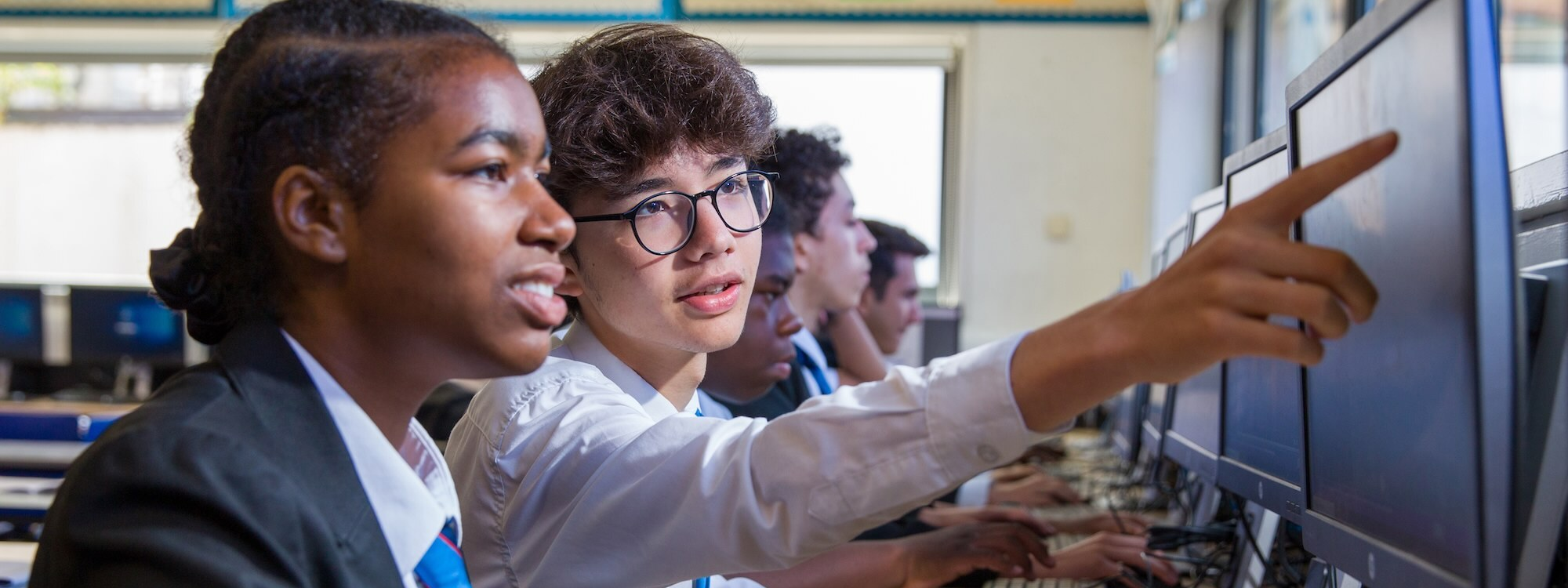- Home
- Curriculum
- Curriculum Overview
- Computer Science
KS3 Computer Science
In September 2014, computing replaced ICT as a national curriculum subject at all key stages. Computing is concerned with how computers and computer systems work, how they are designed and programmed, how to apply computational thinking, and how to make best use of information technology.
Computing is split into 3 main strands:
| Digital Literacy | Understand a range of ways to use technology safely, respectfully, responsibly and securely, including protecting their online identity and privacy; recognise inappropriate content, contact and conduct and know how to report concerns. |
|---|---|
| Information Technology |
Undertake creative projects that involve selecting, using, and combining multiple applications, preferably across a range of devices, to achieve challenging goals, including collecting and analysing data and meeting the needs of known users. Create, re-use, revise and re-purpose digital artefacts for a given audience, with attention to trustworthiness, design and usability. |
| Computer Science |
Design, use and evaluate computational abstractions that model the state and behaviour of real-world problems and physical systems. Understand several key algorithms that reflect computational thinking; use logical reasoning to compare the utility of alternative algorithms for the same problem Use two or more programming languages, at least one of which is textual, to solve a variety of computational problems; make appropriate use of data structures design and develop modular programs that use procedures or functions. Understand simple Boolean logic and some of its uses in circuits and programming; understand how numbers can be represented in binary, and be able to carry out simple operations on binary numbers. Understand the hardware and software components that make up computer systems, and how they communicate with one another and with other systems. Understand how instructions are stored and executed within a computer system; understand how data of various types can be represented and manipulated digitally, in the form of binary digits. |
At Park View we believe that each component is essential in preparing pupils to thrive in an increasingly digital world.
GCSE Computer Science
Students who opt to study Computer Science at KS4 will be undertaking the OCR GCSE Computer Science course. The qualification will build on the knowledge, understanding and skills established through the Computer Science essentials of the Key Stage 3 programme of study.
GCSE Computer Science encourages students to think creatively, innovatively, analytically, logically and critically.
Specification:
https://www.ocr.org.uk/Images/225975-specification-accredited-gcse-computer-science-j276.pdf
Recommended Textbooks:
https://www.cgpbooks.co.uk/Parent/books_gcse_cs.book_COS41
OCR Cambridge Nationals – Information Technologies
Students who opt to study IT at KS4 will be undertaking the new vocational course in IT and acquire the skills in studying Information Technology to aid progression to further study. It will prepare students to enter the workplace. The course is designed to give students a real understanding of their digital environment, develop key skills, and prepare them for their future use of IT in their chosen careers across a wide range of job roles.
The course focuses on data, how it is collected, used, processed, interpreted and presented within the framework of an IT project life cycle. It will allow learners to be confident IT users across a range of digital technology, developing their transferable skills and knowledge to continue to be confident IT users with new technology as it emerges.
There are potential employment opportunities in the Digital and Social Technology or Computing sectors. This course could lead to Level 3 OCR or BTEC or ‘A’ Level courses in the Sixth Form and Further Education. It will also support progression into employment through Apprenticeships in areas such as Digital Marketer or Business Administrator.
Specification:
https://www.ocr.org.uk/Images/371960-specification.pdf




